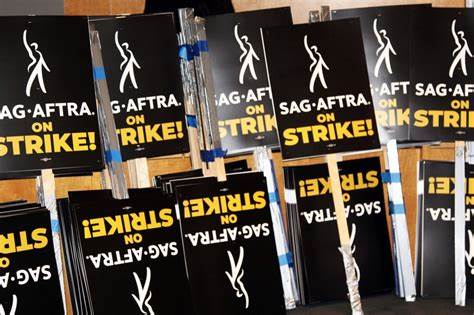The entertainment industry is currently facing uncertainty as actor strikes disrupt the production of movies and TV shows. With the ongoing strike of the Writers Guild of America and the impending strike of the Screen Actors Guild-American Federation of Television and Radio Artists (SAG-AFTRA), the release of new content and the return of beloved shows are uncertain.
Since May 2, more than 11,000 members of the Writers Guild of America have been on strike, causing an immediate halt to the production of new episodes of popular late-night shows. Data from film permits in California indicates that the writers’ strike has already halted the production of most shows and movies. While some completed movies like “Barbie” and “Oppenheimer” are set to hit theaters, ongoing revisions and changes often require the presence of writers during production. As a result, the pipeline of new shows is slowing down significantly.
Approximately 160,000 actors belonging to SAG-AFTRA are preparing to go on strike after the union’s government board votes in favor. Members have already overwhelmingly voted (98%) to authorize the strike. Once the strike commences, actors will cease working, impacting publicity efforts for movies already scheduled for release. Red carpet appearances and interviews will be affected, further limiting the exposure of upcoming films.
To prepare for the strikes, streaming services have been stockpiling new movies and shows to maintain a consistent flow of content. Platforms like Netflix have expressed their readiness for such events, ensuring a robust slate of releases for an extended period. However, the strikes will undoubtedly slow down the production of new shows, affecting the pipeline of fresh content available to viewers.
While the hope is that simultaneous strikes by writers and actors will pressure studios and streaming services to improve their offers and resume production swiftly, there is no clear indication of how long these strikes will persist. The industry is currently experiencing unprecedented change due to evolving consumption patterns and shifting economic dynamics. Factors such as shrinking broadcast residuals in the streaming era have contributed to the unions’ discontent and their resolve to seek fair agreements.
The ongoing writers’ strike and the impending actors strike have thrown the entertainment industry into turmoil. With production halts, delayed releases, and limited opportunities for publicity, the return of favorite shows and the release of highly anticipated movies will be delayed. Streaming services have attempted to mitigate the impact through stockpiling efforts, but the consequences of the strikes are inevitable. The industry is at a crossroads, facing unprecedented changes and negotiations that will shape the future of how we consume entertainment.
